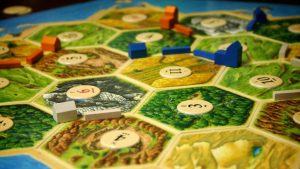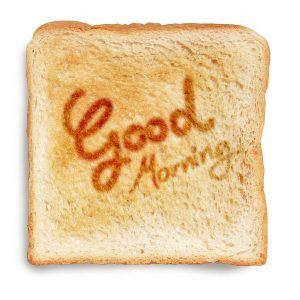Gaming Poetics: Hexagon, Hexagon Again
5 Minutes Read Time
James Ellenberger: The Settlers of Catan is a resource-management game that requires each player to stake out territory on a lovely, numbered hexagonal landscape. As the game progresses, the players rely on dice rolls (both their own and those of their competitors) to restock their coffers with wool, ore, lumber, grain, and brick so they can build roads, cities, and additional settlements. Players may trade resources, but most are acquired by rolling the dice. The game, then, is a mixture of early board evaluation (i.e., where to settle), luck, and one’s ability to balance personal progress with the progress of others, which is a ided by trading. You want, in other words, to trade freely until it becomes clear that those trades will result in a loss.
ided by trading. You want, in other words, to trade freely until it becomes clear that those trades will result in a loss.
What does any of this mean for poetry? In Catan, each hexagon has a number on it (2–12), reflecting the possible rolls of the dice. A hexagon with a 6 or an 8 will most likely be rolled more frequently in the course of the game. Hexagons with 2 and 12 are rolled rarely, and plots numbered thus are often considered less-than-optimal places to begin your civilization. If we’re to think of this in terms of poetry, there are certain structures and subject matters that have historically fallen into the 6 or 8 category. Nightingales were all the rage in England, an easy 8. Sound poetry isn’t as widely loved, probably putting it around an 11—in Catan terms, something less likely to succeed. But who’s to say what will happen over the course of the game? Who’s to say that in twenty years sound poetry won’t be an 8 as well? As the tides of taste ebb and flow, probabilities fluctuate. One may end up edging out the competition—creating something meaningful to many, something lasting—despite the odds.
Is it more satisfying to play on the margins, shooting for the 11 and 12 tiles, putting one’s faith entirely in lady luck? Or is it more satisfying to use probability to your advantage? Should we follow our brains, our hearts, our histories, or the muse? Poets generally pick and choose among these categories, not opting for one particular mode over another. For example, the sonnet form, a true classic, can be augmented in a way that evokes its history without carbon-copying its classical interests. As poets, we’re always foregoing one form for another, a stark image for something more ghostly, a concrete moment for something invested more in musicality. We weigh our options, assess our resources, and then we begin to build.
 “Fertility Treatments, Toast,” a poem by Cate Lycurgus in our current issue, does something that I love: It merges two subjects (breakfast and fertility) in a way that makes us look at both differently. If breakfast were a Catan hexagon, I’d give it, say, a 2; I’ve read some poems about breakfast, some stunning ones, but it’s not generally what comes to mind when I think of poetry. Fertility, however, is an 8 for sure. Birth and death are the bread and butter of poetry, with love smeared on, either liberally or sparsely, depending on who you’re asking.
“Fertility Treatments, Toast,” a poem by Cate Lycurgus in our current issue, does something that I love: It merges two subjects (breakfast and fertility) in a way that makes us look at both differently. If breakfast were a Catan hexagon, I’d give it, say, a 2; I’ve read some poems about breakfast, some stunning ones, but it’s not generally what comes to mind when I think of poetry. Fertility, however, is an 8 for sure. Birth and death are the bread and butter of poetry, with love smeared on, either liberally or sparsely, depending on who you’re asking.
In taking something that we expect from poetry (discussions of birth, of life ongoing—or of life attempted) and linking with something that isn’t immediately identified with art, Lycurgus manages to make the familiar feel fresh and the quotidian really sizzle. Some of my favorite moments here involve the liminal spaces between the lexicons. For example:
if it’s you
clinging well-
oiled or butter’s better
Baby, best
to hash this out
I’m enamored with the double meaning of “Baby.” It’s simultaneously a concrete aspect of this relationship (i.e., a term of endearment) and a kind of negative space, an absence: the idea of a baby rather than the flesh-and-blood thing. In a similar vein, the usage of “hash” speaks toward breakfast and the fragmented nature of this conversation, the difficulty of it, creating an immediately compelling subtext. As a reader, I very much feel “the thing that cannot be said” that lingers around this table.
In Catan, the “scope” of a player’s game begins before luck has a chance to rear its (sometimes ugly) head; the world is, in essence, your oyster. The decision of where to settle is made actively, intentionally. If you choose to put down stakes by the desert, or on plots labeled 2 or 11, then the path of luck is all you’ve got; probability isn’t on your side. “Luck” is relatively intangible, like the muse, inspiration, or however else you’d like to approach it.
The “scope” of Lycurgus’s poem, its form and function, is to marry two sets of images and words. In selecting both familiar and unfamiliar poetic subjects, Lycurgus rewards her readers for noticing the subtle, brutally intelligent lines drawn between some relatively common phrases in English. The “luck” behind poems is whether they stay with a readership or not, whether people will find them to be surprising. Once a poem is written and out of your hands, who knows what a readership will do with your work? In choosing to bridge these two subjects, Lycurgus shifts the balance, changes the stakes, and in making us painfully aware of the possibility of loss, wins us to her side.
